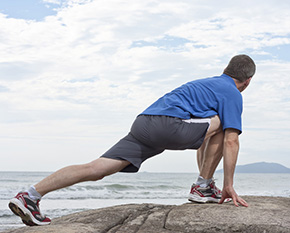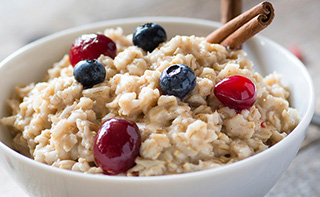Ask the Expert
Author by Nisha Jani
So exactly how important is it to stretch before exercising?
Stretching before an exercise is too often misunderstood. Be careful not to confuse warming up with static stretching. Static stretching involves holding a stretch for 20-30 seconds; however stretching cold muscles can lead to injury. There has been much debate about the benefits of stretching before exercise due to varying factors in the available studies. No definitive, strong conclusions have been made, however it is true that an “active warm up” is greatly beneficial for the body. Say you want to go for a run – before you begin, it’s critical to increase the body’s overall temperature and warm up the muscles. The best way to approach this is through “active” stretching. So before running, it’s ideal to focus on a low impact move like brisk walking. This is not only a great warm up, but also activates those same muscle groups that will be utilized during running. In this way, active, or dynamic stretching, aids the body by increasing the range of motion and blood flow to the muscles. This increases synovial fluid in the joints, arouses neural connections between mind and muscle, and sparks the body’s metabolic shift. You are prepping your body for moderate to intense activity, decreasing the chance of injury later. |
I usually eat 3 big meals; should I be eating several smaller meals a day?
The idea of eating all day long in smaller portions is often referred to as “grazing.” Grazing has its benefits, which include controlling one’s appetite, feeling energized, and increasing the variety of nutrients consumed. Of course, benefits are user-dependent and everyone responds differently. But when the practice of eating less and more frequently is applied properly, the improvements can make a world of a difference. When eating fewer meals, be sure to watch the caloric intake – eating more meals does NOT constitute as eating more calories! It is best to break up the larger meals into smaller portions throughout your day. You want to keep or decrease your overall total caloric consumption (depending on your individual goals). Research shows eating more frequently can give the body more opportunity to sit down and overeat. This can lead to serious issues. The trick is to eat when you’re actually in need, but not so ravenous that you overeat. Ask yourself if you are truly hungry or just bored. Keep fruits, veggies and healthy snacks on hand when feeling low on energy. This helps increase levels of satiety. It may be difficult at first, but practicing this technique over time can form a powerful new habit. You will find yourself less hungry and full of energy, lowering the intensity of post-meal crashes (we’ve all felt that 3 o’clock crash!). And remember, always balance your eating habits with the practice of daily exercise. |
What’s the best thing to eat before working out?  A question I have been asked by many! Before a workout, it’s best to maintain a good balance of carbs and protein. Feel free to modify as you deem delicious! Keep in mind you want to eat about 30 – 60 minutes in advance to give your body the chance to digest and absorb.
|

About the Expert Nisha Jani earned a Master’s in Exercise Physiology and Sports Medicine from the University of Miami, where she also studied psychology and kinesiology. She currently pursues athletic training & strength conditioning, while working full time in cardiology. Nisha’s expertise in exercise and physiology fuel her lifelong passions of dance, fitness, and teaching. She is passionate about bringing awareness to the community about the benefits of preventative medicine in the form of exercise and diet, favoring a holistic approach to well-being. |
||
 Submit your health, nutrition, and diet questions to info@deshvidesh.com |
||



























